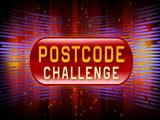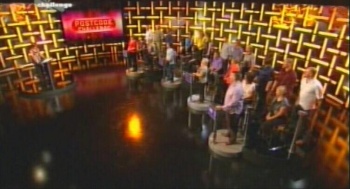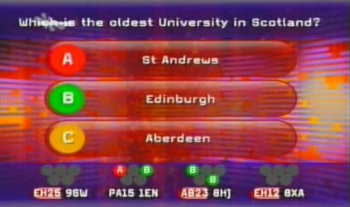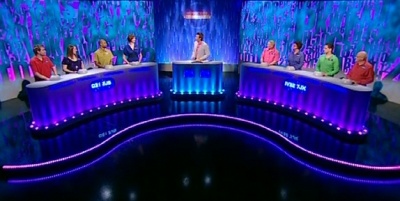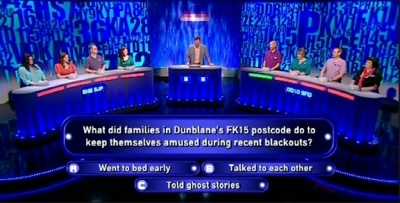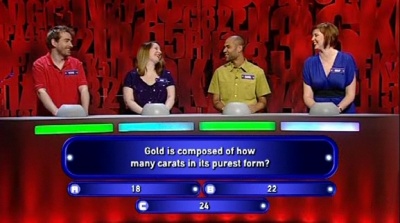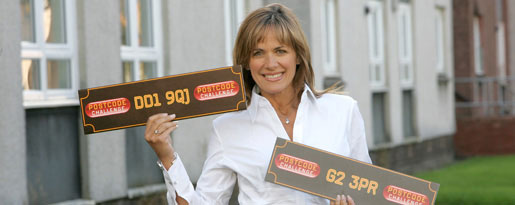Postcode Challenge
Contents |
Host
Carol Smillie (2007-09)
Angus Purden (2010-11)
Broadcast
SMG Productions for STV (regional), 12 November 2007 to 2011
Synopsis
Four teams of six neighbours, each team of six sharing the same or similar postcode, answer general knowledge questions for a cash prize, which is determined in the second half of the show. Each team is identified by its postcode, which may be a bit of a misjudgement on someone's part because seeing your postcode area on the telly just isn't as exciting as seeing your village, even if they amount to the same thing. Put "Banchory" on the front of a podium and everyone in or near Banchory will be rooting for the team, but it's hard to imagine anyone getting excited by a team representing AB31 5JF, even if they happen to live in AB31 5JG.
The teams are made up of a main contestant ("team captain") and five of their neighbours ("team members"). The captain answers questions directly to Carol whilst the neighbours answer via keypads.
There are four rounds in all (sort of - the fourth is really just a "reveal" of results from the third) with one team knocked out in each of the first three. In the first, the captains answer multiple-choice questions on keypads. The team members whose captain answered correctly the fastest are then given a multiple choice question of their own, and a majority correct answer on this second part takes the team through to the next round. The second round is the same principle reversed: the team members answer questions on their keypads, and the captains then answer the supplementary question.
The third round is a head-to-head affair in which all players answer five multiple-choice questions. Afterwards, the team members are banished from the studio (via a woefully out-of-place Star Trek visual effect) while the captains' right and wrong answers are revealed, and whichever team's captain got fewer right will go home empty-handed.
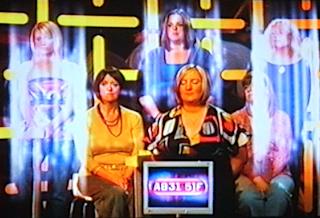 If only STV hadn't blown the budget on a futuristic particle beam transporter, the back row could have had chairs as well.
If only STV hadn't blown the budget on a futuristic particle beam transporter, the back row could have had chairs as well.The winning captain's team then returns to the studio, and go through the money ladder, their progress determined by how many got each successive question right. To progress up the ladder they need at least one person to have got the first answer right, two to have got the second and so on. The highest jackpot prize possible is £25,000 - a decent prize on regional television, it has to be said, though it's unlikely to be won very often and the next rung down is only ten grand. Half of the money goes to the captain whilst the other half is shared amongst the five neighbours.
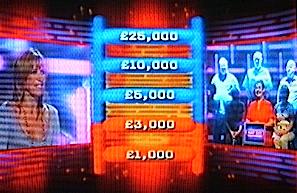 The three illuminated players answered the second question correctly, so they've successfully lit up the second rung of the ladder.
The three illuminated players answered the second question correctly, so they've successfully lit up the second rung of the ladder.As with (almost) any format, there's good and bad elements here. On the credit side, it's a properly-integrated team quiz and not just individuals playing in turn, and the idea of having a captain with special responsibility is a good one. The music is rather generic quiz show fare but at least it's not loaded with fake tension like some (these days, most) game show scores we could mention. On the debit side, Smillie was rather mediocre as a host, the contestant introductions go on for ages (we didn't time it, but we reckon it was about three days) after which the players still feel rather anonymous, and ultimately it's just another drawn-out multiple choice quiz, and haven't we had enough of them for the time being?
40 episodes were originally planned, but the show has evidently done well enough to be recommissioned. A small innovation from August 2008 (and, we would guess, the 41st episode?) is that there's now a 25 grand jackpot prize in addition to the standard money ladder, and it rolls over until someone wins it, so potentially there could be a biiiiiig money payout somewhere down the line. Also, as if in response to our complaint about the teams feeling anonymous, they now put interviews with next week's contestants up on the STV website. It doesn't make much difference, mind, but it's an extra 1.5 minutes of fame for a few people and we won't begrudge them that. While we're in an updating mood, we should also mention that there have been a few celebrity editions with teams representing charities, captained by the likes of Bryan Burnett, Kaye Adams, Ford Kiernan from Still Game and her off of Balamory.
Bring on the surveys
The show returned to production during Spring 2010, with Angus Purden (who had been fronting the sponsor's ads) replacing Smillie as host and boasting more than a few highly-contrived adjustments. The captain's greater role is dropped and only two teams of four contestants play the game, with the original elimination mechanic itself eliminated, to be replaced with a standard point-scoring system.
The opening round now partly involves surveys each conducted in a given postcode area - the contestants answer the same question individually on the keypads and the team with the most correct answers (or, in the event of a tie, the fastest correct answers) takes 'control of play' before being asked three more questions ever so tenuously (and tediously) linked with the original survey, on which they confer and answer through their captain.
Round two becomes a 90-second timed general knowledge round for each team - the team members take turns to answer each question but only a correct answer will allow them to move onto the next person.
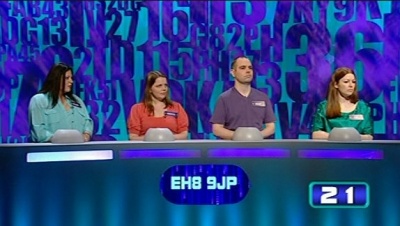 Round two: questions start with the captain (in this case, the player on the right) and move to the next player when one is answered correctly. Here, quiz show veteran Melanie Beaumont faces the next question.
Round two: questions start with the captain (in this case, the player on the right) and move to the next player when one is answered correctly. Here, quiz show veteran Melanie Beaumont faces the next question.The final involves the winning team 'decoding their postcode' - the code itself is split up into five parts, each involving a question (loosely related to the parts of the postcode itself - for example, a team from DD10 got questions on D-Day and what 10 represents in the Beaufort Scale) and increasing cash prizes. All the team members answer the same question individually - at least one person must answer question 1 right but two must answer question 2 right and so on. The team must decide after each question whether to go onto the next question or leave with the cash. The final open-ended question worth £25k is answered by the entire team. Purden usually reveals whether each individual team member has got an answer right or wrong one at a time, and boy, does he like his "dramatic" pauses. You'd think he was practising for the day when he gets to say "The X Factor champion is..." - except that if he ever got the call to do that, he'd probably have to rein it in a bit.
All in all, we're split on this show. In its original format, some of us thought it was OK whilst the rest of us considered it stupendously awful (the ghost of Caledonia MacBrains, anyone?), but - while it still falls short of brilliance - the revamp is a distinct improvement, especially the introduction of the timed round. They've also clearly put a bit of effort into making it look halfway decent, which helps.
Trivia
Sponsored by The People's Postcode Lottery, already played in the Netherlands and Sweden.
Recorded at BBC Scotland, Pacific Quay, Glasgow - next door to STV!
Promotional tagline: The show that's right up your street. Also used for contestant calls: Get your road on the show!.

